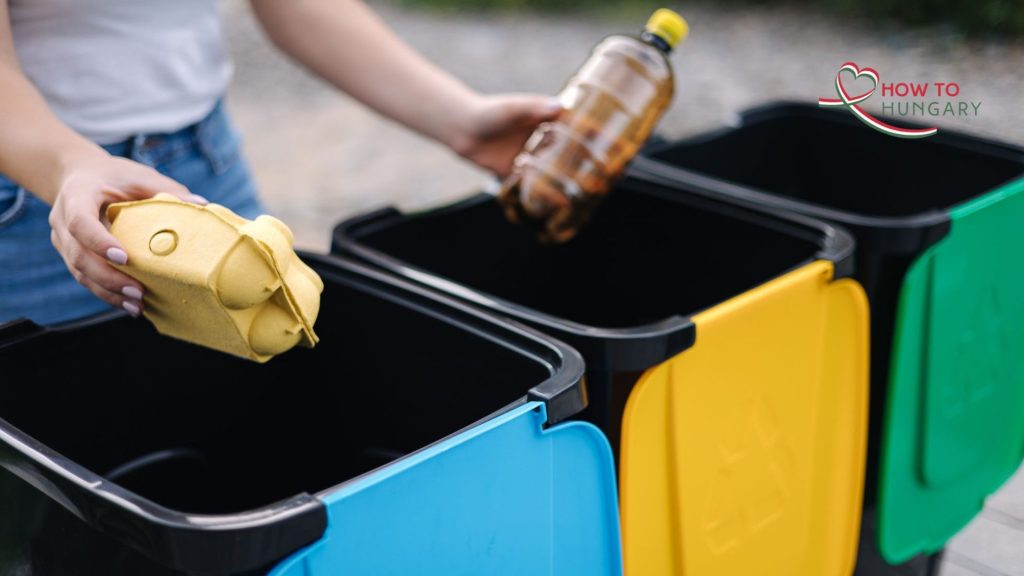As watch the bins being hauled out this morning – first chilly one of October – I realised our street in Budapest looked a little more alert than usual. Lids properly shut. No artful pyramids of recycling. It’s not paranoia: MOHU waste collection rules 2025 kicked in yesterday, and everyone’s feeling watched. We split our time between the city and the Balaton Highlands, so I’m writing this for both house-dwellers and apartment-folk: what actually changed on 1 October, what didn’t, and how to keep your rubbish day… unremarkable.
MOHU waste collection rules 2025 -the plain-English version
Let’s start with the headline: MOHU updated its terms and conditions (ÁSZF) effective 1 October 2025, but the day-to-day routine for household bin collection and pricing stays the same. The flurry of alarming posts – “they won’t take your bin if they spot a milk carton!” – mixed old rules with new clarifications. The official line repeated across outlets is that normal collection continues as before.
What actually changed on 1 October 2025
From the ASZF update and MOHU’s summaries reported by national and regional outlets, these are the real changes (and clearer definitions):
-
Waste yards (Hulladékudvar) rules tightened. Daily and annual drop-off limits are now explicit (e.g., up to 16 tyres per year; up to 600 kg of bulky waste per year per property). From 1 January 2026, dropping off construction and demolition waste becomes fee-based.
-
“Mobile waste yard” introduced. Expect scheduled pop-up collection days in smaller towns and harder-to-reach areas – a new service model embedded in the ASZF.
-
Green-waste bags and bulky-waste wording clarified. Providers must still ensure at least one bulky-waste opportunity a year; the exact format and details are being reviewed locally.
What did not change (but was re-stated, loudly)
Much of the drama came from rules that already existed but weren’t widely known. They’ve been re-emphasised and will likely be enforced more consistently:
- Keep recyclables out of the mixed bin. Paper, plastic and metal cannot go in the general rubbish; neither can e-waste or construction debris. Use selective bins, waste yards or designated drop-offs.
- Lid must close; no overflow. If the lid is ajar or waste is sticking out, that counts as excess waste and may be refused or billed as an extra service.
- Weight limits apply by bin size. Typical caps include 15 kg (60L), 17 kg (80L), 27 kg (120L), 50 kg (240L), 175 kg (770L), 250 kg (1100L). Overweight bins can be left behind.
- Damaged bins must be fixed quickly. If the bin is unusable and it’s not the haulier’s fault, the property user must repair or replace it within 8 days; collection can be refused meanwhile, but charges can still apply.
- About fines. MOHU (as the concession) itself does not issue fines to households; however, serious violations (e.g., hazardous or clearly prohibited materials) can lead to penalties by authorities, and bins can be refused or extra charges applied. Reports of HUF 20–30k penalties refer to heavier cases of non-compliance.
How to comply in a flat or house (quick checklist)
- Know who’s responsible. Hungarian rules refer to the ingatlanhasználó (the property user). In practice, tenants are usually responsible for day-to-day compliance: shutting lids, not overfilling, and keeping the bin serviceable. Coordinate with your landlord on repairs.
- Split your streams. Keep paper, plastics and metal out of the mixed bin. Slightly rinse food-soiled packaging so it’s not contaminated – you don’t need to sterilise, just make it reasonably clean and dry.
- Watch the weight. If you’re regularly overweight, you likely need a bigger bin or an extra pickup (where available) to avoid refusals and charges.
- Bulk wisely. Use your municipality’s annual bulky-waste service for items that don’t fit in a bin, but note: no construction rubble or e-waste via bulky day. Take those to a waste yard (fees for rubble from 2026).
- Use waste yards (or mobile ones). Tyres, electronics, metal, wood, etc., all have clear limits and processes. Keep your address card handy; many sites require proof you’re a resident. For more info, search here: mohu.hu

Sort it right: keep recyclables out of the mixed bin and make sure the lid closes on collection day.
Common pitfalls & myths to avoid
- “If the lid’s a bit open, they’ll still take it.” Don’t risk it. An open lid is the classic reason for refusal, and extra charges can follow for overflow.
- “They’re bringing in huge new household fines.” Not for routine hiccups. The system is not a fine-fest; the biggest shift is clearer enforcement of existing standards, plus waste-yard updates and future fees for rubble.
- “I’m a renter, so my landlord handles everything.” Not necessarily. You (the occupant) usually manage day-to-day compliance, while the owner handles bin replacement costs if agreed in your lease. Check your contract and talk early.
Helpful resources & links
- Official docs: MOHU’s plain-language ASZF update (effective 1 Oct 2025) and the full ASZF (PDFs) – worth bookmarking if you manage a building or HOA.
- Background coverage with clarifications: Pénzcentrum summarises (in Hungarian) what changed (and what didn’t) clearly; THT gives a building-manager view; TEOL lists yard limits and confirms no new “everyday disruption.”
- Internal read: If you’re setting up a new flat or sorting admin, my piece on the Hungary Name on Mailbox Law helps you avoid missed post (yes, your name must be on the bell and box).
FAQ (schema-friendly)
Do the MOHU waste collection rules 2025 change my weekly pickup or fees?
No. Normal household collection and pricing continue as before; the updates mainly clarify existing standards and adjust waste-yard rules
Will they leave my bin if the lid’s open or it’s too heavy?
Yes, they can refuse collection for overflow or overweight bins, and extra service charges may apply for excess waste.
Where do I take construction rubble or e-waste?
To a waste yard (or scheduled mobile waste yard). Note that construction waste will be fee-based from 1 January 2026.
Lids down, carry on
For me, October always marks a gear-shift: back to routines, back to lists… and now back to closing bin lids properly. Between Budapest life and our weekends in the Highlands, it’s one of those small habits that saves hassle. If you’re renting, have a quick word with your landlord about bin condition and bulky-waste dates now, before the leaves pile up and the festive season distracts us all.
And if you want more of this plain-language life admin – the useful, unglamorous bits of living here – my ebook HOW TO HUNGARY: Budapest & Beyond covers the nuts and bolts with links and real-world context.
Sign up for my FREE monthly newsletter – the HOW TO HUNGARY Insider.
Living in a new country is never simple, but it doesn’t have to be overwhelming. Each month, I share the latest Hungary updates, expert advice, personal insights from someone who’s actually done it – and absolutely no hidden agendas.
Real experience. Expert tips. One email a month. Thanks for being here – köszi, hogy itt vagytok! Ha tetszett, kövessetek!

Anikó Woods is a Canadian-Hungarian writer, technology specialist, and digital strategist who swapped Toronto traffic for Hungarian bureaucracy. She’s the creator of HOW TO HUNGARY: Budapest & Beyond. Since moving to Hungary in 2017, she’s been deep in the paperwork trenches – fact-checking, interviewing experts, and helping others make sense of the madness. Her writing turns chaos into clarity, with a few laughs (and wine recommendations) along the way.

0 Comments